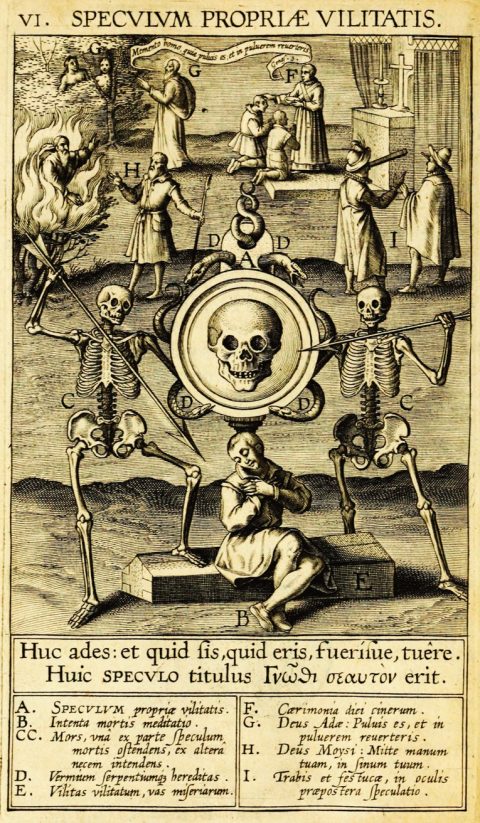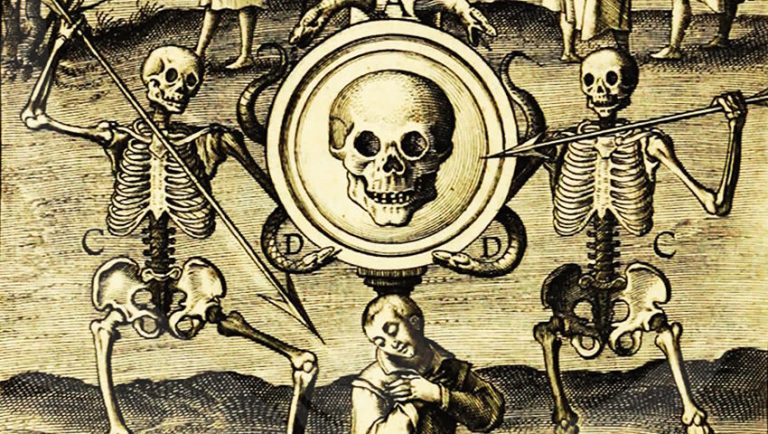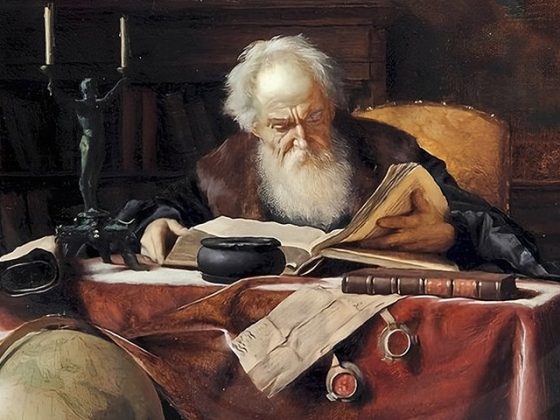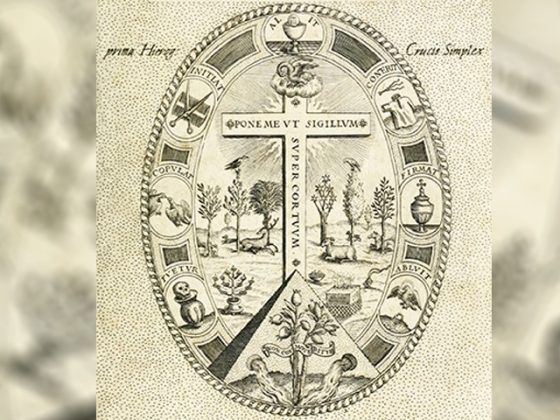Very endearing reader friends:
I am sending you the sixth drawing with which Theodor Galle illustrated the book Dvodecim specula Devm aliquando videre desideranti concinnata, ‘Twelve mirrors duly arranged for the person who wishes to see God one day', written by the Jesuit Ioanne David (1546-1613). The present engraving is entitled…
…KNOW THYSELF

Let us begin this description with the following sentence: Huc adestradnos: et quid eris, fuerisque, ‘Here you are: and look at what you are, what you will be, and what you were.'
Through a few Latin sentences we will gradually enter into what this engraving wants to tell us. At the top:
VI. SPECVLVM PROPRIAE VILITATIS: ‘Mirror of one’s own vileness’.
Under the engraving:
Huc ades: et quid sis, quid eris, fuerisque, tuere: ‘Here you are: and look at what you are, what you will be, and what you were.'
Huic Specvlo titulus Γνῶθι σεαυτόν erit: “This mirror will be entitled ‘Know Thyself'.
Sentences from the bottom of the engraving:
- Specvlum propriae vilitatis: ‘Mirror of one’s own vileness’.
- Intent mortis mediatio: Intentional meditation on death.
- Mors, una ex parte speculum mortis ostendens, ex altera necem intendens: ‘Death, on the one hand showing the mirror of death, on the other hand with the intention of killing'.
- Vermium serpentium[que] hereditas: ‘Inheritance of worms and serpents'.
- Vilitas vilitatum, vas miseriarum: ‘The baseness of baseness, the vessel of miseries'.
- Caerimonia diei cinerum: ‘Ceremony of Ash Wednesday'.
- Deus Adae: Puluis es, et in puluerem reuerteris: ‘God to Adam: Dust you are and to dust you shall return'.
- Deus Moysi: Mitte manum tuam, in sinum tuum: ‘God to Moses: Put your hand into your bosom'.
- Trabis et festucae, in oculis praepostera speculatio: ‘Inopportune observation of the planck and the speck in the eyes'.
In the center of the image we see a large mirror that shows a skull ─A─. Under the mirror sits a young man ─B─ with his hands folded over his chest and his head tilted to one side in meditation. The mirror is surrounded by serpents ─D─ and held on the right and left by two skeletons ─C─, each holding a spear in one hand with which they point to the man and the skull. Under the mirror, where the young man is sitting, there is a coffin ─E─. In the background, human insignificance is represented by the drawing of the cross on the forehead that, symbolically, is traced on Ash Wednesday ─F─, and on the left by the scene in which God speaks to Adam and Eve ─G─, with the following words written on a parchment: Memento home, quia pulvis es, et in pulverem reverteris ─Genesis 3─, ‘Remember, oh man, that dust you are and to dust you shall return.'
In the middle plane, on the left, God appears to Moses in the burning bush ─H─, referring to the text of Exodus 4 that we will quote below. On the right ─I─ two men are talking, one of whom is identified with the beam and the other with a speck in his eye, as an illustration of the parable of Matthew 7:
“Judge not, that you be not judged. For with what judgment you judge, you will be judged; and with the measure you use, it will be measured back to you. And why do you look at the speck in your brother’s eye, but do not consider the plank in your own eye? Or how can you say to your brother, ‘Let me remove the speck from your eye’; and look, a plank is in your own eye? Hypocrite! First remove the plank from your own eye, and then you will see clearly to remove the speck from your brother’s eye…”
Matthew 7
Dear readers, without a doubt this engraving is full of images that insist on the imperative need to die psychologically in order to really give consistency to our individual psychological work.
The illustrator took sentences alluding to biblical chapters to show, obviously, what our inner work should be.
The fact of seeing the two skeletons that appear in the center of a shield pointing to death, is to vehemently remind us of the urgency of taking advantage of our existence, because sooner or later we will leave this three-dimensional world and the only thing that has to matter to us is to have achieved our sacred individuality.
It is also important to observe the monk meditating sitting on a coffin while one of the skeletons points its spear at him. Let us remember that phrase that Master Samael mentions when he speaks to us of the monks who live on the top of Mount Athos: “Brother, we must die,” and the one who hears him replies: “We already know that.”
The death of the “I” is the only task that should matter to us for the duration of our existence in the school of life…, nothing else!
Below I quote from Exodus 4, which is intimately related to the letter “H”, let us see:
“God gives powers to Moses.
1 Then Moses answered and said, “But suppose they will not believe me or listen to my voice; suppose they say, ‘The Lord has not appeared to you.’ ”
2 So the Lord said to him, “What is that in your hand?” He said, “A rod.”
3 And He said, “Cast it on the ground.” So he cast it on the ground, and it became a serpent; and Moses fled from it.
4 Then the Lord said to Moses, “Reach out your hand and take it by the tail” He reached out his hand and caught it, and it became a rod in his hand.
5 “That they may believe that the Lord God of their fathers, the God of Abraham, the God of Isaac, and the God of Jacob, has appeared to you.”
6 Furthermore the Lord said to him, “Now put your hand in your bosom.” And he put his hand in his bosom, and when he took it out, behold, his hand was leprous, like snow.
7 And He said, “Put your hand in your bosom again.” So he put his hand in his bosom again, and drew it out of his bosom, and behold, it was restored like his other flesh.
8 “Then it will be, if they do not believe you, nor heed the message of the first sign, that they may believe the message of the latter sign.
9 And it shall be, if they do not believe even these two signs, or listen to your voice, that you shall take water from [a]the river and pour it on the dry land. The water which you take from the river will become blood on the dry land.”
10 Then Moses said to the Lord, “O my Lord, I am not eloquent, neither before nor since You have spoken to Your servant; but I am slow of speech and [b]slow of tongue.”
11 So the Lord said to him, “Who has made man’s mouth? Or who makes the mute, the deaf, the seeing, or the blind? Have not I, the Lord?
12 Now therefore, go, and I will be with your mouth and teach you what you shall say.”
13 But he said, “O my Lord, please send by the hand of whomever else You may send.”
14 So the anger of the Lord was kindled against Moses, and He said: “Is not Aaron the Levite your brother? I know that he can speak well. And look, he is also coming out to meet you. When he sees you, he will be glad in his heart.
15 Now you shall speak to him and put the words in his mouth. And I will be with your mouth and with his mouth, and I will teach you what you shall do.
16 So he shall be your spokesman to the people. And he himself shall be as a mouth for you, and you shall be to him as God.
17 And you shall take this rod in your hand, with which you shall do the signs.”
EXodus 4
The book consists of 12 engravings, 12 speculum ─'mirrors'─, with these attributes:
Specvlvm Commune: ‘Common mirror’.
Specvlvm Fallax: ‘Mirror that deceives'.
Specvlvm Vrens: ‘Burning mirror'.
Specvlvm Complacentiae: ‘Mirror of complacency'.
Specvlvm Ocvlorvm Alienorvm: ‘Mirror of the eyes of others'.
Specvlvm Propriae Vilitatis: ‘Mirror of one’s own vileness’.
Specvlvm Pvrgativvm: ‘Purgative mirror'.
Specvlvm Creatvrarvm: ‘Mirror of Creation'.
Specvlvm S. Scriptvrae: ‘Mirror of the Sacred Scripture'.
Specvulvm Exemplare: ‘Mirror of the example'.
Specvlvm Aenigmaticvm: ‘Enigmatic mirror ─of the parables─'.
Speculum Visionis Beatificae: ‘Mirror of the beatific vision'.
I now send you a few sentences for reflection:
“False modesty is the most decent of all lies.”
Chamfort
“It is not by growing in power that he who is false will arrive at the truth.”
Rabindranath Tagore
“He who loves falsehood is not far from loving vice.”
Chateaubriand
“There is no falsehood so foolish that it is not supported by some witness.”
Pliny
“The soul has illusions like the bird has wings, that is what sustains it.”
Victor Hugo
FIAT JUSTITIA AUT PEREAT MUNDUS.
─'Let justice be done though the world may perish'─.
KWEN KHAN KHU





